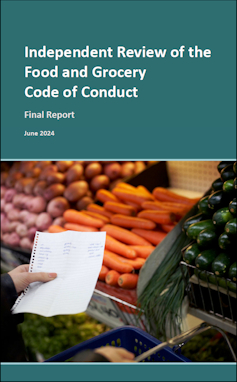Fines of $10 million will force supermarkets to think carefully before exploiting suppliers, but more could have been done
- Written by Allan Fels, Professorial Fellow, The University of Melbourne

Suppliers of food and other products have been complaining for years about their treatment at the hands of Woolworths, Coles and Australia’s other big supermarket chains, although rarely to the supermarkets themselves – perhaps, as suggested in a recent Four Corners program, because they feared retribution[1].
The final report of the independent review of the food and grocery code of conduct released today by economist and former government minister Craig Emerson finds they’ve had reason for complaint[2], and devotes an entire chapter to the “fear of retribution”.
Emerson rightly says the problem with the code is it has been voluntary and not backed by penalties.
He has recommended a mandatory code backed by hefty fines of up to A$10 million, or three times the benefit gained from the contravening conduct or 10% of turnover in the preceding 12 months, whichever is the greater.
The government has accepted his recommendations[3] and Woolworths, Coles, ALDI and Metcash (which buys goods on behalf of IGA) have agreed in principle to be bound by a decision of a mediator to award compensation of up to $5 million for breaches of the code.
Retailers have always denied treating suppliers badly, but the Australian Competition and Consumer Commission has found compelling evidence[4] of exploitation and unconscionable conduct which has been accepted by the Federal Court.
The code has been voluntary
It is sometimes said that retailers have to be tough on suppliers in order to get consumers low prices. A former top US competition regulator once told me that “if retailers beat the s*** out of suppliers, customers will benefit”.
Of course, this is only true where there is strong competition among retailers. Emerson’s proposed mandatory code will work better if it is backed by stronger laws to enforce competition.
The existing voluntary code of behaviour has been ineffective. Emerson reports that farmers and other suppliers haven’t wanted to put buyers offside[5] by using it.
His proposed solutions are a new anonymous complaints mechanism alongside fines of up to $10 million.
My experience tells me big sticks like this are often effective without even being used. Their mere existence will make Coles and Woolworths and Aldi and Metcash go out of their way to treat suppliers more carefully.
Emerson should have gone further
Oddly, Emerson asserts that under the Constitution a mandatory code cannot impose binding arbitration on a company.
He seems unaware codes already do this in industries including telecommunications[7] and most recently in the news media bargaining code[8].
While Emerson recognises the importance of strengthening competition laws, he stops short of supporting giving the courts the power to force divestiture of supermarkets where supermarket chains abuse their positions, not mentioning that Labor (perhaps due to pressure from the Shop, Distributive and Allied Employees Association) is the only political party[9] not to support such a sanction.
Emerson’s report says forced divestiture of stores might not be credible because it might push these stores into the hands of other big chains or force them to close.
This repeats the standard assertions of Coles and Woolworths, and it fails to acknowledge that forced divestiture could be used effectively in other ways, by making supermarkets divest their petrol or liquor or other operations.
The Australian Competition and Consumer Commission has experience with divestiture of supermarkets. In 2001 it ensured the Frankins group was broken up[10] rather than taken over intact, with most of its stores going to Metcash and branded as IGAs.
Woolworths and Coles might not have been keen to mention this.
Personally, I believe that a general divestiture power[11] should be introduced for all businesses. Retail would not be very high on my list of possible targets.
Regardless, the $10 million penalty and the other processes recommended by Emerson and adopted by the government are going to make a big difference. Supermarket chains are going to have to tread carefully from here on.
References
- ^ feared retribution (www.abc.net.au)
- ^ had reason for complaint (treasury.gov.au)
- ^ accepted his recommendations (treasury.gov.au)
- ^ compelling evidence (jade.io)
- ^ put buyers offside (treasury.gov.au)
- ^ Treasury (treasury.gov.au)
- ^ telecommunications (www.acma.gov.au)
- ^ news media bargaining code (www.accc.gov.au)
- ^ only political party (www.smh.com.au)
- ^ broken up (www.accc.gov.au)
- ^ general divestiture power (theconversation.com)
Authors: Allan Fels, Professorial Fellow, The University of Melbourne














